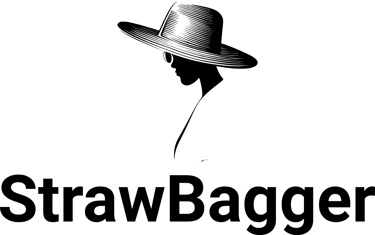Adopt a "strawbagger mindset!"

Ecovero
Ecovero: Its Benefits and Uses
Ecovero™ is an eco-responsible viscose fiber made from wood pulp sourced from FSC- or PEFC-certified forests. Produced by Lenzing AG, it uses up to 50% less water and emits up to 50% less CO₂ than conventional viscose production.
Benefits:
Traceable and Transparent: Fully traceable from forest to final product.
Lower Environmental Impact: Requires less water and energy compared to traditional viscose.
Soft and Comfortable: Drapes beautifully, with a silky texture.
Certified Sustainable: Sourced from responsibly managed forests with EU Ecolabel certification.
Biodegradable: Returns safely to the environment after use.
Uses:
Dresses, blouses, and flowy garments.
Fashion tops and skirts.
Eco-friendly labels and linings.
Blended fabrics for a soft, luxurious feel.
Let's take a Closer Look at Ecovero
Ecovero as a Sustainable Fabric
1. What is Ecovero Fabric?
Ecovero™ is a branded form of viscose (rayon) produced by the Austrian company Lenzing AG, known for its sustainable wood-based cellulosic fibers.
It is made from certified renewable wood sources (primarily beech and eucalyptus) using an eco-responsible production process with high transparency and low environmental impact.
Ecovero is considered a next-generation viscose, developed to overcome the environmental challenges of traditional viscose production, including deforestation, chemical pollution, and lack of traceability.
Fibers carry the EU Ecolabel, verifying that they meet high environmental standards throughout their life cycle—from raw material sourcing to production and disposal.
2. Environmental Benefits
Sustainable Raw Materials:
Made from FSC® (Forest Stewardship Council) or PEFC® (Programme for the Endorsement of Forest Certification) certified wood, ensuring sustainable forest management.
Low Emissions Production:
Ecovero production creates up to 50% fewer emissions compared to conventional viscose.
Reduced water use and fewer chemicals are released into the environment, thanks to closed-loop processing that recovers and reuses solvents and water.
Transparency and Traceability:
Lenzing provides supply chain transparency, enabling brands and consumers to trace the origin of the raw materials.
Biodegradable and Compostable:
Like other Lenzing fibers, Ecovero is fully biodegradable and compostable, safely breaking down in soil or marine environments.
3. Durability and Longevity
Comparable to Traditional Viscose:
Ecovero offers the same soft drape, sheen, and smooth hand feel as conventional viscose but with enhanced sustainability credentials.
Moderately Durable:
While more delicate than cotton or polyester, Ecovero maintains its integrity with proper care and is suitable for garments not subject to heavy wear.
Color Fastness:
Fibers absorb dyes deeply and hold color well, allowing for vibrant, long-lasting hues with less dye and water usage.
4. Low-Waste Production
Cleaner Manufacturing Process:
Production uses a closed-loop system that recovers most of the chemicals and water used in the process.
50% lower water impact compared to standard viscose.
Controlled Chemical Use:
Employs non-toxic or less harmful solvents, reducing hazardous waste and pollution.
Reduced Energy Requirements:
More efficient than conventional viscose in terms of energy use, especially when produced at Lenzing’s state-of-the-art facilities.
5. Versatility and Comfort
Luxurious Feel:
Soft, silky, and breathable, making it ideal for blouses, dresses, scarves, underwear, loungewear, and sustainable fashion collections.
Great Drapability:
Ecovero fabric flows beautifully, offering a high-end look suitable for elegant or everyday wear.
Temperature Regulating:
Naturally breathable and moisture-wicking, helping to keep the wearer cool and comfortable.
Blends Easily:
Often blended with organic cotton, TENCEL™, elastane, or recycled fibers for added strength or stretch.
6. Economic and Social Impact
Supports Ethical Supply Chains:
Lenzing partners with certified forests and transparent suppliers, promoting fair labor practices and responsible sourcing.
Consumer Confidence:
The EU Ecolabel and Lenzing branding give retailers and consumers assurance of authenticity and sustainability.
Growing Popularity in Sustainable Fashion:
Increasingly used by ethical and slow fashion brands as a viscose alternative in both high fashion and casual wear.
Accessible Luxury:
While more expensive than conventional viscose, it remains affordable for brands and consumers looking for sustainable alternatives.
7. Circular Fashion and Ecovero
Designed for Circularity:
Ecovero's biodegradability and compostability support circular economy principles.
Brands can integrate it into take-back, reuse, and upcycling programs with confidence that it won’t harm the environment at end-of-life.
Compatible with Green Manufacturing Models:
Works well in closed-loop fashion production, especially in lines prioritizing minimal waste and low-impact design.
Extended Product Life:
While less rugged than cotton or linen, Ecovero garments can be long-lasting with proper care, supporting the "buy less, buy better" ethos.
8. Things to Consider
Delicate Nature:
May not be suitable for heavy-duty clothing (like outerwear or activewear) without blending for added strength.
Requires gentle washing (cold water, mild detergent, air-drying) to avoid fiber breakdown.
Slightly Higher Cost:
More expensive than traditional viscose but less costly than premium fabrics like TENCEL™ or silk.
Beware of Greenwashing:
Not all "eco-viscose" is Ecovero. True Ecovero fabric comes with Lenzing certification and labeling—always check for verified sourcing.
